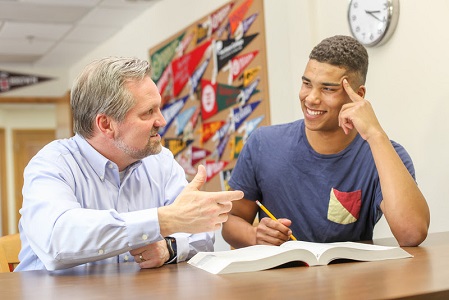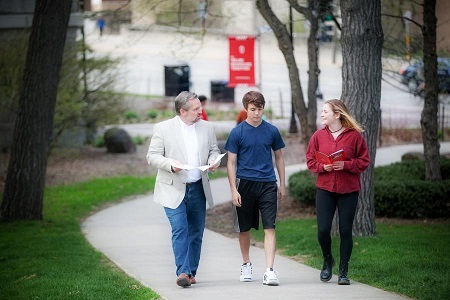
Ask These 3 Questions On College Campus Visits
College campus visits are an essential part of your college planning journey. If you follow our Facebook page (and you should! Stop right now and head on over and hit LIKE so you don’t miss out!) or you follow us on Instagram (and you should! Get that done now.) you’ve probably heard me harp non-stop about the importance of college campus visits. Visit early. Visit often. Here are the key questions you must ask during your college campus visits to get the most out of those visits! If you didn’t catch our Facebook Live video on this topic, check it out here. If you’re more of a reader than a watcher, keep on reading, or just keep this as your notes from our video on key questions for college campus visits.
Three Goals of College Campus Visits

- Learn more about the specific college you’re visiting. Yeah, obvious, I know.
- Learn more about that specific “type” of college (large, public research university or a small, liberal arts college, medium-private university) Once you’ve visited one large, public research university, you’ll have a better sense of whether that “type” of school is right for you and whether or not you should visit more colleges like that one.
- Learn more about College in general and build on the University of You definition. By “University of You™”, we mean what you Need/Want/Don’t Need/Don’t Want in your own ideal college experience. For more about the University of You and how to define yours, schedule a free consult with us anytime! If you’re in the Madison, Wisconsin area, you can do this in person at our office, or for those in other parts of the country, we do this via video conference as well.
Every college campus visit you take helps you accomplish these three key goals. In that sense, there is no such thing as a “bad college visit”, even if what you learn is, “that college isn’t for me.” Or “That type of college isn’t for me”. The more college campuses you visit, the more you’ll learn what makes a college a good fit or a bad fit for you. The more colleges you visit, the smarter you’ll be when it comes time to build your college shopping cart.
The Main Problem With Most College Campus Visits

The Three Key Questions to Ask During A College Campus Visit
Over more than ten years of taking regular college campus visits all over the country, here are the three PRICELESS questions I’ve found to be the most productive when it comes to learning about colleges during a college campus visit. These questions are GOLD, my friends, and they should be in your arsenal of the MUST-ASK questions during your next college campus visit. Ask students you encounter during your time on campus these three key questions. Here they are!
“Why did you choose [insert name of college]?” Don’t just say, “this college”. Insert the name of the college you’re visiting. If you’re at Valparaiso, say, “Why did you choose Valpo?”
- Then ask, “Do you mind if I ask what other colleges you were considering and what tipped the scales in favor of Valparaiso/Valpo [insert name of college here]?” The reason for this question is to identify overlaps or “cross apps”. Valpo, for instance, is a medium-sized, private, church-affiliated university, so it would have a lot in common with other Midwest-based, medium-sized, private, church-affiliated universities like Drake, Xavier, Butler or St. Thomas. You could gather quite a bit of information from learning what other schools students applied to. If you keep hearing one name over and over again, go check out that college, too. You may hear the name of a school you’ve never heard of that should be on your list.
- Finally, “If you had a magic wand, what would you change about Valpo?” I used to ask this differently, “What’s the worst thing about this college?” Or “What don’t you like about this college?” But I found that people got a little bit defensive. No one wants to say anything bad about the school they’ve chosen. Everyone wants to feel they’ve made the best choice for them. The magic wand question diffuses this quite a bit. Even if you’ve made the best choice for you and it’s nearly perfect, most people will be able to tell you at least one thing they’d change if they had a magic wand. You’ll hear really interesting things when you ask this question.
Why it’s challenging to ASK STUDENTS QUESTIONS during your college campus visit.
I get it, folks. Asking students these questions pushes you out of your comfort zone. But frankly, isn’t getting out of your comfort zone a big part of what the shift to college is all about? And let’s face it. The fact that you’re making a six-figure+ purchase here is uncomfortable! Why wouldn’t you take the extra steps to ensure you’re making the best college decisions you can?
And yet, it’s super uncomfortable. For one thing, many people wear headphones around campus and they’re on their phones. This is different than when I started doing this 10 years ago. Tapping someone on the shoulder when they’re eyeball-deep in a screen is uncomfortable. Yet when I’ve done it, time and time again, I’ve been surprised how willing students are to share their experience about two of their favorite topics: THEM and THEIR CHOSEN COLLEGE. Also, you’re a high school student and it’s hard to approach a college student and ask them questions. It takes courage. It just does. This whole process takes courage and will push you out of your comfort zone. There’s no better, more efficient way to get answers to your questions than when you’re live and in front of the people who know this school best: the students who go there. Remember that they, too, were once in your shoes, and they know how anxious you’re feeling. You’ll be surprised how helpful they’ll want to be when you simply ask.

- Ask your tour guide. This is the easiest ask of all.
- Ask the student working at the university bookstore behind the counter. Ask while they’re ringing up your swag. I do this all the time!
- Ask the student working as a server in the restaurant you try on or near campus. Ask them if they’re a student, and then dive into your three key questions.
- Ask a student sitting by themselves in the Union as you walk through. It’s less scary sometimes to approach an individual than a small group, although…
- Ask a group of 2-3 students, because often they’ll be more likely to talk if you say, “Hey, I’m visiting today. Can I ask the two/three of you a couple of super-quick questions about being a student here?” Often, when I’ve done this, I’ve been shocked at how long they want to talk about their experience. I hear them play off one another and compare notes, and I learn a TON in the process. Plus, you get 2-3 perspectives for the price of one. Bonus!
- If you can, in advance of your visit, ask if you can sit in one a class in the department or field you’re interested in, and then ask students from that class as class is dismissed. Often, the professor will mention that you are there as a visitor and even prompt students to offer help, which they will. Our son Joe had this experience. Two students talked his ear off for nearly an hour toward the end of a college class period. He still says that was the highlight of his visit to that college campus, because he felt, “They weren’t trying to sell me anything. They were just being honest.”
For additional insights on steps to take both pre-visit and post-visit to maximize your college campus visits, check out our full-length Facebook video. You can also email me for detailed information on how to make the most of your college campus visits and even great note-taking tools like our Campus Visit Bullet Journal. We specialize in helping you make the most of every step of your college planning journey, and great college campus visits are at the top of that list.
And remember, if you have pressing college planning questions, schedule a FREE consult anytime.

 “Why did you choose [insert name of college]?” Don’t just say, “this college”. Insert the name of the college you’re visiting. If you’re at Valparaiso, say, “Why did you choose Valpo?”
“Why did you choose [insert name of college]?” Don’t just say, “this college”. Insert the name of the college you’re visiting. If you’re at Valparaiso, say, “Why did you choose Valpo?”
 It’s sophomore year, time to put your big kid pants on! It’s also time to
It’s sophomore year, time to put your big kid pants on! It’s also time to  Just as sophomore athletes move up from the freshman team to the JV team, continue to add to your academic skill set throughout your sophomore year. Take academics to the next level in terms of commitment and the way you challenge yourself. Remember, the cumulative GPA you use to apply to colleges will be based on three (not four) years of high school. Sophomore year is prime time for dropping dimes in the classroom. Continue to build your academic stats, and you’ll end up with solid credentials by the time you apply to college. This could mean increasing your GPA, maintaining a rigorous curriculum, or even taking your first AP class (remember, AP exam credits often translate to less Gen Eds in college, which means you save money.)
Just as sophomore athletes move up from the freshman team to the JV team, continue to add to your academic skill set throughout your sophomore year. Take academics to the next level in terms of commitment and the way you challenge yourself. Remember, the cumulative GPA you use to apply to colleges will be based on three (not four) years of high school. Sophomore year is prime time for dropping dimes in the classroom. Continue to build your academic stats, and you’ll end up with solid credentials by the time you apply to college. This could mean increasing your GPA, maintaining a rigorous curriculum, or even taking your first AP class (remember, AP exam credits often translate to less Gen Eds in college, which means you save money.)  Schedule your first practice ACT exam during the spring of your sophomore year. This will give you a benchmark heading into your junior year, so that you’ll know where you currently stand in relation to admission or merit aid thresholds. After taking your first practice exam and getting your score back, you can look at the Affordability/Scholarships page of your college options—which often contain information about ACT requirements for varying levels of merit aid—and see how much money you’d receive without seeking further test prep help. Compare that to what you could earn if you increase your ACT score. Nearly all college websites have a net price calculator located somewhere within the site, which allows you to plug in financial data and/or GPA and test scores to see your expected cost of attendance.
Schedule your first practice ACT exam during the spring of your sophomore year. This will give you a benchmark heading into your junior year, so that you’ll know where you currently stand in relation to admission or merit aid thresholds. After taking your first practice exam and getting your score back, you can look at the Affordability/Scholarships page of your college options—which often contain information about ACT requirements for varying levels of merit aid—and see how much money you’d receive without seeking further test prep help. Compare that to what you could earn if you increase your ACT score. Nearly all college websites have a net price calculator located somewhere within the site, which allows you to plug in financial data and/or GPA and test scores to see your expected cost of attendance.  We offer
We offer
Recent Comments